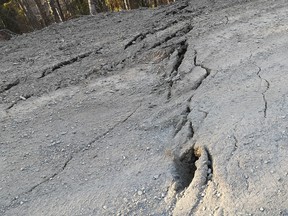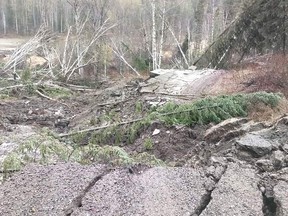Climate change is contributing to more landslides and washouts, but "we can't armour every hill slope above every road in the province."

The cost to repair roads damaged by landslides and washouts across B.C. could reach almost $500 million this year, almost four times the amount spent five years ago, according to Ministry of Transportation data that shows expenditures rising year over year.
Repairs due to “emergency events” in the 2022/23 fiscal year are expected to top $470 million, four times the $101 million spent in 2018/19 and more than double the $191 million spent last year, with funding coming from both the provincial and federal governments.
Start your day with a roundup of B.C.-focused news and opinion delivered straight to your inbox at 7 a.m., Monday to Friday.
Thanks for signing up!
A welcome email is on its way. If you don't see it, please check your junk folder.
The next issue of Sunrise presented by Vancouver Sun will soon be in your inbox.
While much of the repairs continue to be a result of the devastating storms in November 2021, the data shows the costs associated with landslides and washouts steadily rising over the last five years.
“Even if we recognize that the events of the last year have been extreme, there’s an expectation we’ll see more of that,” said University of B.C. geology professor Brett Gilley. “It’s a complicated mess.”
Gilley said the problem is driven in part by climate change, which can bring more destabilizing events such as wildfires and rainstorms, as well as aging infrastructure.
The geologist said there are several ways of managing landslide risk, including engineering solutions involving “blasting, bolts and nets,” controlling where the landslide goes, or moving people and infrastructure out of the way.
With much of B.C. built on floodplains or landslide deposits — and limited government resources to deal with the problem — getting to “zero” risk is impossible
“Everywhere there’s mountains, we have issues,” said Gilley. “We can’t armour every hill slope above every road in the province.”
Conditions are particularly challenging in B.C.’s Cariboo region, which has been plagued by several large landslides in the last few years, including continuous “land slippage” above homes in Williams Lake.
Two years ago in April, the road from Hixon to Quesnel slid into the Cottonwood River. That morning, horse trainer Carolyn Dobbs-Sutherland noticed a deep crack running across the old highway and stopped to take a photo. A few hours later, the road was gone.


“The road system is horrendous,” she said Wednesday from her ranch in the B.C. Cariboo. “It’s been gradually declining for years.”
Dobbs-Sutherland must now take another route into Quesnel, which adds about 20 minutes on a nice day and up to an hour-and-a-half in rough weather.
“We seem to always be last on the list,” she said. “Our roads are just deteriorating. They’re so old and in need of upkeep.”
Cariboo-Chilcotin Liberal MLA Lorne Doerkson said the province needs to do a better job communicating with concerned residents. It’s unclear if wildfires or other changes in the region’s landscape are to blame.
“This is a hard item to pin down,” he said. “There needs to be more engagement and a fulsome conversation to explain what is happening here.”
Doerkson said he appreciates that the issue is complex and each landslide might have a different cause.
A Ministry of Transportation briefing note prepared for Minister Rob Fleming in May 2021 noted that flooding and washouts had impacted about 200 sites across the Cariboo region the previous year. While work was ongoing to repair most sites, about 10 required “extraordinary effort” with no clear source of funding at that time.
The document noted that across the province projected costs to repair slides and washouts have been “trending up,” from $10 million in 2016/17 to $60 million in 2020/21.
In a statement, Ministry of Transportation communications director Dave Crebo said $30 million was “notionally allocated” for emergency repairs to highway infrastructure in the 2022/23 fiscal year based on historic spending.
But it is estimated that $470 million will be spent, including emergency repair work to highways damaged during the November 2021 atmospheric river, as well as ongoing recovery work from significant events in previous years, such as the extensive damage in the Cariboo.
-

Wild day for hundreds trapped by double mudslides on B.C.'s Highway 7
-

Shock, disbelief and grief: Families mourn lives lost in deadly mudslide
-

Monitoring of steep slopes needed after massive landslide near Prince Rupert: Scientist
gluymes@postmedia.com
twitter.com/glendaluymes


